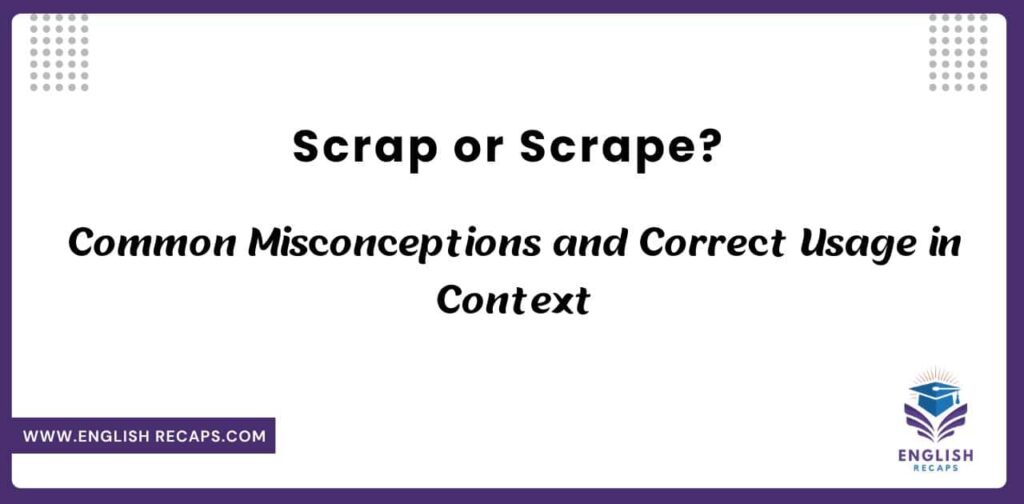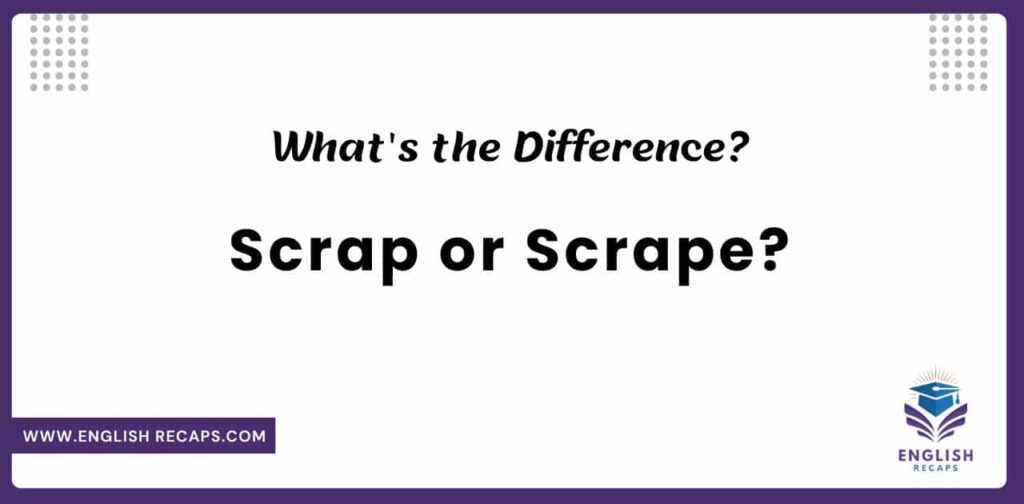Ever caught yourself wondering if you should use “scrap” or “scrape” in a sentence? You’re not alone. These tricky twins trip up even the best of us.
Let’s clear the air:
- Scrap means to throw away or discard something.
- Scrape involves rubbing or dragging against a surface.
So, is it correct to say scrap or scrape? Well, it depends on what you’re trying to say!
If you’re tossing out old papers, you’re scrapping them. If you’re removing ice from your windshield, you’re scraping it.
Simple, right? But don’t worry if you’re still scratching your head. We’re about to dive deeper into these word cousins and make sure you never mix them up again!
The Scrap vs. Scrape Conundrum: Why It Matters
Picture this: You’re writing an important email to your boss, and you’re about to use one of these words. Suddenly, doubt creeps in. Should you say you’re “scraping together” a report or “scrapping” it altogether? The difference could mean keeping your job or being shown the door!
Understanding the nuances between “scrap” and “scrape” isn’t just about acing your English test. It’s about communicating clearly and avoiding potentially embarrassing or costly mistakes in your day-to-day life.
Understanding the Basics: Definitions and Distinctions
Let’s break it down, shall we?
Scrap:
- As a verb: To discard, throw away, or abandon something
- As a noun: A small piece or bit of something, often leftover or discarded
- Can also mean a fight or argument (usually a minor one)
Scrape:
- As a verb: To rub or drag a sharp or rough object across a surface
- As a noun: The act of scraping or the mark left by scraping
- Can also mean to barely manage or succeed with difficulty
These definitions might seem straightforward, but the devil’s in the details. The key is understanding how these words function in different contexts.
Common Misconceptions and Correct Usage in Context

Why “Scraping” and “Scrapping” are Not Interchangeable
Here’s where many people trip up. “Scraping” and “scrapping” might look like they could be swapped, but they’re about as interchangeable as a fork and a spoon at a soup-eating contest.
“Scraping” involves that abrasive action we talked about. You might be scraping ice off your windshield on a frosty morning or scraping the last bit of peanut butter from the jar.
“Scrapping,” on the other hand, means you’re throwing something away or getting rid of it. You might be scrapping an old project idea or scrapping your car when it’s beyond repair.
Visualizing the Actions: What Does Each Word Represent?
To really cement the difference, let’s paint a picture with words:
Scraping: Imagine you’re renovating your house. You’re standing on a ladder, paint scraper in hand, arm moving back and forth as you remove old, peeling paint from the walls. That’s scraping a physical action involving friction and surface contact.
Scrapping: Now picture yourself cleaning out your garage. You come across an old bicycle that’s rusted beyond recognition. After a moment’s consideration, you decide to scrap it toss it in the trash or take it to the junkyard. That’s scrapping getting rid of something you no longer need or want.
The Impact of Autocorrect and Spell-Check on Common Errors
In our tech-savvy world, we often rely on autocorrect and spell-check to catch our mistakes. But here’s the kicker these tools have limitations, especially when it comes to words like “scrap” and “scrape.”
Autocorrect might change “scrape” to “scrap” (or vice versa) without you noticing, completely altering the meaning of your sentence. And spell-check? Well, it might not flag either word as incorrect because they’re both valid English words.
This is where your own understanding becomes crucial. No technology can replace a solid grasp of language nuances and word distinctions. It’s up to you to catch these potential mix-ups and ensure you’re using the right word in the right context.
Don’t miss out read this blog:
Is It Correct to Say “Good Luck with Your Future Endeavors”?
From Scratches to Scraps: The Evolution of Language
From Old English to Modern American Usage: A Brief History
Ever wondered how we ended up with these tricky twins? Let’s take a quick trip down etymology lane.
“Scrape” has its roots in the Old English word “scrapian,” meaning to scratch or scrape. Over time, it evolved to include the idea of barely managing or succeeding with difficulty like when we say someone is “scraping by.”
“Scrap,” on the other hand, comes from Old Norse “skrap,” meaning a small piece or fragment. It later developed the verb form we use today, meaning to discard or abandon.
This evolution shows how language adapts and changes over time, influenced by social, cultural, and linguistic factors. Understanding this history can help us appreciate the subtle differences between these words and use them more accurately.
Ever wondered why some shapes look so pleasing to the eye? Or why engineers love using certain shapes in their designs? It’s all about the properties of shapes. Understanding these properties helps us see the world in a new way. Let’s dive into the fascinating world of Geometry Spot to explore the magic behind shapes!
Mastering the Art of Scrap and Scrape: Practical Tips
Now that we’ve dived deep into the world of “scrap” and “scrape,” let’s look at some practical ways to remember the difference:
- Think action vs. object: “Scrape” usually involves an action (rubbing against a surface), while “scrap” often refers to an object (a small piece) or the act of discarding.
- Use mnemonic devices: “ScrapE” has an “E” for “Effort” it takes effort to scrape something. “ScraP” has a “P” for “Piece” a scrap is a piece of something.
- Context is key: Always consider the surrounding words and the overall meaning of the sentence. This can often guide you to the correct choice.
- When in doubt, look it up: There’s no shame in double-checking. In fact, it’s a sign of someone who cares about clear communication.
Case Studies: Real-world Examples of Scrap and Scrape in Action
Let’s look at how these words play out in various real-life scenarios:
- In the Kitchen:
- Scrape: You might scrape the bottom of a pan to prevent food from burning.
- Scrap: After dinner, you might scrape food scraps into the compost bin.
- In the Workplace:
- Scrape: Data analysts often scrape information from websites for research.
- Scrap: A company might decide to scrap an unsuccessful product line.
- In Daily Life:
- Scrape: You might accidentally scrape your knee if you fall while jogging.
- Scrap: You might scrap plans for a picnic if the weather turns bad.
Beyond Scrap and Scrape: Expanding Your Vocabulary
While we’re on the topic of similar-sounding words, let’s explore a few more pairs that often cause confusion:
- Affect vs. Effect
- Accept vs. Except
- Complement vs. Compliment
- Stationary vs. Stationery
Understanding these distinctions can further enhance your communication skills and help you avoid common language errors.
Don’t miss out read this blog:
‘Gooned’: Definition, Meaning, and Examples
The Role of Context in Language Understanding
One of the fascinating aspects of language is how context can shape meaning. A word like “scrap” can have different connotations depending on its usage:
- In metalworking, scrap metal is a valuable resource.
- In cooking, scraps might be seen as waste or as ingredients for stock.
- In boxing, to scrap means to fight.
This versatility demonstrates the importance of context in language and the need for a nuanced understanding of vocabulary.
Improving Your Language Skills: Practical Exercises
Ready to put your new knowledge to the test? Try these exercises:
- Fill in the blank: “He had to _____ (scrap/scrape) ice off his car windshield.”
- Correct the sentence: “They decided to scrape the entire project due to budget cuts.”
- Use both words in a sentence about cooking.
(Answers: 1. scrape, 2. scrap, 3. Example:
“After scraping the last bit of batter from the bowl, she scraped the eggshells into the scrap bucket.“)
The Impact of Clear Communication in Professional Settings
In the workplace, using the right words can make a significant difference. Imagine these scenarios:
- A project manager tells the team they need to “scrap together” some resources. The team is confused are they gathering resources or getting rid of them?
- A data analyst reports “scraping” important information from the company database. The CEO panics, thinking valuable data has been deleted.
These examples highlight how misusing “scrap” and “scrape” can lead to misunderstandings, wasted time, and potential business losses. Clear, accurate communication is crucial in professional settings.
Language Learning and Second Language Speakers
For those learning English as a second language, distinctions like “scrap” vs. “scrape” can be particularly challenging. Many languages don’t have direct equivalents for both words, making it harder to grasp the nuanced differences.
If you’re an English language learner, don’t get discouraged. Even native speakers sometimes struggle with these words. The key is practice and exposure to the language in various contexts.
The Future of Language: Technology and Vocabulary
As language continues to evolve, so does the technology we use to understand and translate it. While current spell-check and autocorrect tools have limitations, future AI-powered language assistants might be better equipped to understand context and suggest the right word based on the intended meaning.
However, it’s unlikely that technology will ever completely replace the need for human understanding of language nuances. Developing a strong vocabulary and grasp of language distinctions will always be a valuable skill.
Wrapping Up: The Importance of Word Distinctions
So, what have we learned on our journey through the world of “scrap” and “scrape”?
- These words, despite their similarities, have distinct meanings and uses.
- Context is crucial in determining which word to use.
- Relying solely on technology can lead to errors human understanding is key.
- Language is complex and ever-evolving, making continuous learning important.
Remember, mastering these distinctions isn’t about being a grammar purist. It’s about communicating clearly, avoiding misunderstandings, and expressing yourself precisely. Whether you’re writing an important email, crafting a report, or just chatting with friends, using the right words can make all the difference.
So next time you’re tempted to “scrap” something off your to-do list or “scrape” together some ideas, take a moment to consider which word truly fits. Your message (and your listeners) will thank you for it.
Keep exploring, keep questioning, and keep learning. After all, language is a tool – the more skillfully you use it, the more effectively you can communicate your thoughts and ideas to the world.
Flowers have captivated human hearts for centuries, symbolizing beauty, love, and the ephemeral nature of life. Their vibrant colors and fragrant aromas have made them an integral part of cultures worldwide. In this article, we explore some of the most popular flowers, their names, and what makes each unique.
Final Words
Confused about “scrap” and “scrape”? You’re not alone! These similar-sounding words have very different meanings. “Scrap” means to throw away or a small piece of something.
“Scrape” is about rubbing against a surface. We use “scrap” when getting rid of stuff, like scrapping an old project.
“Scrape” comes in handy for actions like scraping ice off a windshield. Remember, context is key!
Don’t rely too much on spell-check it might not catch these tricky differences. Understanding these words helps you communicate clearly and avoid mix-ups. So next time you’re writing, take a moment to pick the right word. Your message will be clearer, and you’ll sound like a pro!
FAQ’s
What is the difference between scrap and scrape?
Scrap means to discard something or refers to a small piece. Scrape involves rubbing against a surface. For example, you might scrap an old car (get rid of it) or scrape paint off a wall (rub it away).
What does scrape by mean?
“Scrape by” means to barely manage or survive, often financially. For instance, “After losing his job, he had to scrape by on his savings for a few months.”
Is it scrape or scrap fight?
It’s “scrap fight.” A scrap can mean a minor fight or argument. You might say, “The kids got into a little scrap over the toy.”
What is a scrap example?
A scrap is a small piece or bit of something. Examples include:
- Scrap metal in a junkyard
- Scraps of paper left after cutting
- Food scraps after a meal
What is scrap used for?
Scrap materials are often recycled or repurposed. For instance:
- Scrap metal can be melted down to make new metal products
- Fabric scraps might be used in quilting
- Food scraps can be composted
Which scraper is used to scrap?
This question contains a misunderstanding. Scrapers are used to scrape, not scrap. Different types of scrapers include:
- Paint scrapers for removing old paint
- Ice scrapers for car windshields
- Dough scrapers in baking Remember, we scrape with a scraper, but we don’t “scrap” with it.
Read More English Improving Related Interesting Blogs
What Does “Hi There” Mean and Should You Use It? Read Reason
Is It Correct to Say “How Is It Going?”: Understanding Casual American US English Greetings
Kase Abusharkh Amy Berry: A Journey Of Innovation And Inspiration
Is It Correct to Say “How Is It Going?”: Casual American US English Greetings


